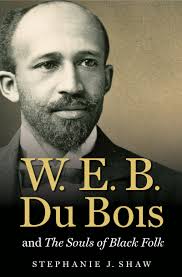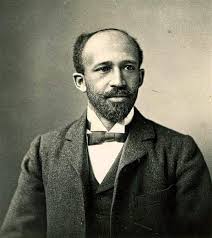The Souls of Black Folk Page #13
The Souls of Black Folk is a 1903 work of American literature by W. E. B. Du Bois. It is a seminal work in the history of sociology and a cornerstone of African-American literature. The book contains several essays on race, some of which the magazine Atlantic Monthly had previously published.
In failing thus to state plainly and unequivocally the legitimate demands of their people, even at the cost of opposing an honored leader, the thinking classes of American Negroes would shirk a heavy responsibility,—a responsibility to themselves, a responsibility to the struggling masses, a responsibility to the darker races of men whose future depends so largely on this American experiment, but especially a responsibility to this nation,—this common Fatherland. It is wrong to encourage a man or a people in evil-doing; it is wrong to aid and abet a national crime simply because it is unpopular not to do so. The growing spirit of kindliness and reconciliation between the North and South after the frightful difference of a generation ago ought to be a source of deep congratulation to all, and especially to those whose mistreatment caused the war; but if that reconciliation is to be marked by the industrial slavery and civic death of those same black men, with permanent legislation into a position of inferiority, then those black men, if they are really men, are called upon by every consideration of patriotism and loyalty to oppose such a course by all civilized methods, even though such opposition involves disagreement with Mr. Booker T. Washington. We have no right to sit silently by while the inevitable seeds are sown for a harvest of disaster to our children, black and white. First, it is the duty of black men to judge the South discriminatingly. The present generation of Southerners are not responsible for the past, and they should not be blindly hated or blamed for it. Furthermore, to no class is the indiscriminate endorsement of the recent course of the South toward Negroes more nauseating than to the best thought of the South. The South is not “solid’; it is a land in the ferment of social change, wherein forces of all kinds are fighting for supremacy; and to praise the ill the South is today perpetrating is just as wrong as to condemn the good. Discriminating and broad-minded criticism is what the South needs,—needs it for the sake of her own white sons and daughters, and for the insurance of robust, healthy mental and moral development. Today even the attitude of the Southern whites toward the blacks is not, as so many assume, in all cases the same; the ignorant Southerner hates the Negro, the workingmen fear his competition, the money-makers wish to use him as a laborer, some of the educated see a menace in his upward development, while others—usually the sons of the masters—wish to help him to rise. National opinion has enabled this last class to maintain the Negro common schools, and to protect the Negro partially in property, life, and limb. Through the pressure of the money-makers, the Negro is in danger of being reduced to semi-slavery, especially in the country districts; the workingmen, and those of the educated who fear the Negro, have united to disfranchise him, and some have urged his deportation; while the passions of the ignorant are easily aroused to lynch and abuse any black man. To praise this intricate whirl of thought and prejudice is nonsense; to inveigh indiscriminately against “the South” is unjust; but to use the same breath in praising Governor Aycock, exposing Senator Morgan, arguing with Mr. Thomas Nelson Page, and denouncing Senator Ben Tillman, is not only sane, but the imperative duty of thinking black men. It would be unjust to Mr. Washington not to acknowledge that in several instances he has opposed movements in the South which were unjust to the Negro; he sent memorials to the Louisiana and Alabama constitutional conventions, he has spoken against lynching, and in other ways has openly or silently set his influence against sinister schemes and unfortunate happenings. Notwithstanding this, it is equally true to assert that on the whole the distinct impression left by Mr. Washington’s propaganda is, first, that the South is justified in its present attitude toward the Negro because of the Negro’s degradation; secondly, that the prime cause of the Negro’s failure to rise more quickly is his wrong education in the past; and, thirdly, that his future rise depends primarily on his own efforts. Each of these propositions is a dangerous half-truth. The supplementary truths must never be lost sight of: first, slavery and race-prejudice are potent if not sufficient causes of the Negro’s position; second, industrial and common-school training were necessarily slow in planting because they had to await the black teachers trained by higher institutions,—it being extremely doubtful if any essentially different development was possible, and certainly a Tuskegee was unthinkable before 1880; and, third, while it is a great truth to say that the Negro must strive and strive mightily to help himself, it is equally true that unless his striving be not simply seconded, but rather aroused and encouraged, by the initiative of the richer and wiser environing group, he cannot hope for great success. In his failure to realize and impress this last point, Mr. Washington is especially to be criticised. His doctrine has tended to make the whites, North and South, shift the burden of the Negro problem to the Negro’s shoulders and stand aside as critical and rather pessimistic spectators; when in fact the burden belongs to the nation, and the hands of none of us are clean if we bend not our energies to righting these great wrongs. The South ought to be led, by candid and honest criticism, to assert her better self and do her full duty to the race she has cruelly wronged and is still wronging. The North—her co-partner in guilt—cannot salve her conscience by plastering it with gold. We cannot settle this problem by diplomacy and suaveness, by “policy” alone. If worse come to worst, can the moral fibre of this country survive the slow throttling and murder of nine millions of men?
Translation
Translate and read this book in other languages:
Select another language:
- - Select -
- 简体中文 (Chinese - Simplified)
- 繁體中文 (Chinese - Traditional)
- Español (Spanish)
- Esperanto (Esperanto)
- 日本語 (Japanese)
- Português (Portuguese)
- Deutsch (German)
- العربية (Arabic)
- Français (French)
- Русский (Russian)
- ಕನ್ನಡ (Kannada)
- 한국어 (Korean)
- עברית (Hebrew)
- Gaeilge (Irish)
- Українська (Ukrainian)
- اردو (Urdu)
- Magyar (Hungarian)
- मानक हिन्दी (Hindi)
- Indonesia (Indonesian)
- Italiano (Italian)
- தமிழ் (Tamil)
- Türkçe (Turkish)
- తెలుగు (Telugu)
- ภาษาไทย (Thai)
- Tiếng Việt (Vietnamese)
- Čeština (Czech)
- Polski (Polish)
- Bahasa Indonesia (Indonesian)
- Românește (Romanian)
- Nederlands (Dutch)
- Ελληνικά (Greek)
- Latinum (Latin)
- Svenska (Swedish)
- Dansk (Danish)
- Suomi (Finnish)
- فارسی (Persian)
- ייִדיש (Yiddish)
- հայերեն (Armenian)
- Norsk (Norwegian)
- English (English)
Citation
Use the citation below to add this book to your bibliography:
Style:MLAChicagoAPA
"The Souls of Black Folk Books." Literature.com. STANDS4 LLC, 2025. Web. 24 Feb. 2025. <https://www.literature.com/book/the_souls_of_black_folk_310>.








Discuss this The Souls of Black Folk book with the community:
Report Comment
We're doing our best to make sure our content is useful, accurate and safe.
If by any chance you spot an inappropriate comment while navigating through our website please use this form to let us know, and we'll take care of it shortly.
Attachment
You need to be logged in to favorite.
Log In